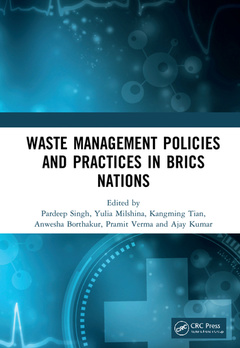Waste Management Policies and Practices in BRICS Nations
Coordonnateurs : Singh Pardeep, Milshina Yulia, Tian Kangming, Borthakur Anwesha, Verma Pramit, Kumar Ajay

Waste Management Policies and Practices in BRICS Nations explores recent developments in waste management. BRICS nations are the emerging economies of the world. Increasing populations, urbanization, industrialization and uses of chemical fertilizer and pesticide in agriculture for enhanced productivity of food, especially in India and China, to support the large populations harm the natural environment. The rise in the living standards of the human population has increased environmental pollution manifold, resulting in the huge generation of biodegradable and non-biodegradable waste simultaneously, which has contaminated natural resources such as soil, water and air. It has led to undesirable effects on the environment and human health.
The book offers comprehensive coverage of the most essential topics, including:
- Waste management problems with special reference to MSW in Brazil, Russia, India, China and South Africa
- Solid waste management in BRICS nations
- Hazardous waste management in BRICS nations
- Policies and laws in BRICS nations
This book contains both policies and methods used for the management of waste in BRICS nations. The chapters incorporate both policies and practical aspects.
PART I MSW Chapter 1 Waste Management in Brazil: Challenges for Municipal Solid Waste Chapter 2 Waste Management Policies and Practices in Brazil Chapter 3 Economic Estimation for a Glass Waste Recycling Facility in Johannesburg, South Africa Chapter 4 Waste Management in India: Status and Challenges Chapter 5 Urban Waste Management Issues in China: With Special Reference to Municipal Solid Waste Chapter 6 Solid Waste Management Practices in India and China: Sustainability Issues and Opportunities PART II Trends and Strategies with Case Studies Chapter 7 Waste Management in Russia: Technological Advances Chapter 8 Different Treatment Technologies Used for Municipal Solid Waste Management in India: Material and Energy Recovery Chapter 9 Technological Innovations for Waste Management in China Chapter 10 Solid Waste Management in Brazil: Policies, Strategies, Treatment Technologies and Disposal Methods Chapter 11 Potential Innovative Technique for the Management of Polystyrene Waste in South Africa Chapter 12 A Review on Leachate Water in BRICS Nations: A Sustainable Perspective PART III Policies and Laws Chapter 13 Policy and Governance for Waste Management in Russia Chapter 14 Recycling of Waste and Policy Frameworks in India Chapter 15 Waste Management Policies and Laws: A Case Study of China Chapter 16 Public Policies and Initiatives for Waste Minimization and Recycling in Brazil PART IV Hazardous Waste Management Chapter 17 Management of Hazardous Waste in Russia Chapter 18 The Impact of Hazardous Waste and Its Management in China Chapter 19 Management of Hazardous Waste in Brazil: Reality, Perspectives and Case Studies
Dr. Pardeep Singh
Dr. Pardeep Singh is presently working as Assistant Professor (Department of Environmental Science, PGDAV College University of Delhi, New Delhi, India). He has obtained his master degree from Department of Environmental Science, Banaras Hindu University, Varanasi, India. He obtained his doctorate degree form Indian Institute of Technology (Banaras Hindu University) Varanasi in. The area of his doctoral research is degradation of organic pollutants through various indigenous isolated microbes and by using various types of photocatalyst. He has published more than 45 papers in the international journals in the field of waste management.
Dr. Yulia Milshina (Russia)
Dr Yulia Milshina is currently working as a Research expert at Institute for Statistical Studies and Economics of Knowledge, National Research University Higher School of Economics, Moscow, Russia. Her field of expertise is in Economic Development focussing on developmental and public economics. She has published research articles and book chapters in leading research journals. She is presently engaged in research related with public-private partnerships, government-corporate partnerships, potential for collaboration and technology application in changing environment. She is also working in the field of application of information and technology framework in environmental management.
Dr. Kangming Tian (China)
Dr. Kangming Tian is currently working as a Scientist at Tianjin University of Science and Technology, Tianjin, China. He has obtained his PhD degree in "Fermentation engineering" from Jiangnan University, Wuxi, China in 2013. His doctoral thesis work is focused biosynthesis of monomers for biodegradable materials production from crude glycerol. He has constructed genetic engineered strains for high purity D-lactic acid and high purity L-lactic acid fermentation for high-quality polylactic acid (PLA) production, the technology of th
Date de parution : 08-2021
17.8x25.4 cm
Thèmes de Waste Management Policies and Practices in BRICS Nations :
Mots-clés :
Schematic Process Flow Diagram; MSW Management; Energy Recovery; Moisture Content; Solid Waste Management; MSW Management System; Ad; Hazardous Waste; Municipal Solid Waste Generally; Hazardous Solid Wastes; Solid Waste; Selective Collection; Hazardous Waste Management; Landfill Leachate; MSW Incineration; Fw Treatment; Recycled Aggregates; Brazilian Municipalities; Separate Waste Collection; Reverse Logistics; Sustainable Solid Waste Management; Solid Waste Generation; ISW; Hazardous Waste Treatment; Sanitary Landfills
